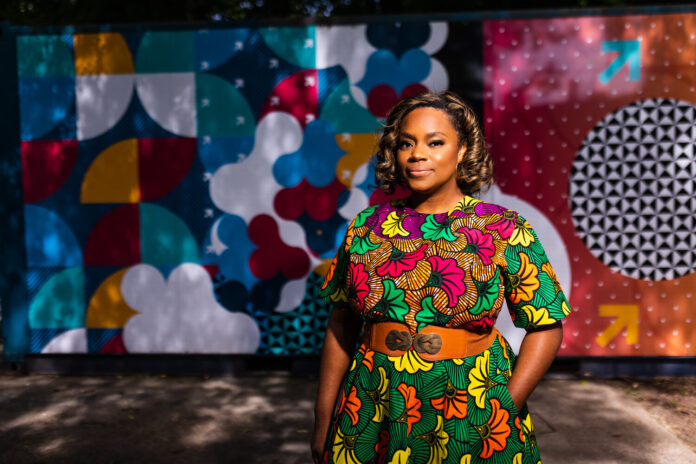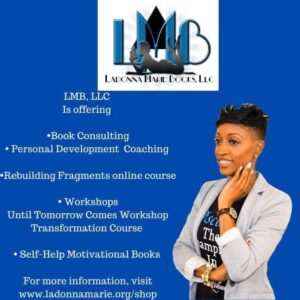In the world of technology, Black women are making significant strides, overcoming obstacles, and pioneering paths for future generations. As we bring you stories of these women, we uncover not just their professional achievements but also their relentless spirit and commitment to creating more inclusive tech spaces.
Dorian Spears is the Director of Partnerships & Strategy at GET Cities, she has dedicated her career to advancing diversity, equity, and inclusion in the tech industry. Her journey began with a passion for technology that started in a library where she learned to code in fifth grade. Her fascination with computers blossomed into a career that spans the nonprofit, economic development, and government sectors. Despite often being the only person of color in the room, she has remained true to her mission to ensure she is not the last. Her work is driven by the belief that the tech sector should be a wealth builder accessible to anyone, regardless of gender or background.
Her experiences as a Black woman in tech have not been without challenges. From facing microaggressions to being set up to fail, she has encountered numerous obstacles. Yet, she has transformed these challenges into opportunities for growth, supported by a strong network of friends, family, mentors, and self-care practices.
Reflecting on her achievements, she takes pride in the impact of GET Cities’ initiatives. Programs like the Tech Equity Working Group have successfully piloted projects that address unique issues faced by women, trans, and nonbinary individuals. These interventions have not only provided solutions but also inspired national change.
Her advice to Black women and other marginalized genders considering a career in tech is to build a supportive network, stay curious, and take care of oneself. She emphasizes the importance of diverse representation in tech, noting that different perspectives lead to innovative solutions that address a wide range of lived experiences.
“We recently announced the next step in our journey of ecosystem development toward gender equity in tech: Transition to Community. Our commitment to long-term, sustainable impact has led us to select three partners to carry out the work of GET Cities over the next several years. We are so proud of the catalytic groundwork we have activated across our cities and networks and for our partners to continue and expand upon the work of building a tech industry that reflects and addresses the needs of all lived experiences.”-Dorian Spears
Khadijah: Can you share a bit about your background and what inspired you to pursue a career in tech and community advocacy?
Dorian: My career spans the nonprofit, economic development, and government sectors. I’ve sat at tables where I’ve been the only person who looks like me in the room. While I may be the only one, I will not be the last. Regarding technology, I was a library kid who learned how to code in 5th grade by using the books available to me. I’ve been fascinated by computers since, and I’ve come full circle in sharing my passion with others. Putting the experiences I’ve gained over the years together in this work has been a joy and honor. While it has not been an easy path, I’ve been aligned with colleagues who care about increasing the representation of women, trans, and nonbinary people in the tech sector. That’s the beautiful side of my work. Current systems of power deliberately leave out most of the population, deepening existing inequities. Technology leads our lives in many ways, and it is time to make room for all of us to participate. The tech sector is a wealth builder and should be an option for anyone who chooses it.
Khadijah: As the Director of Partnerships & Strategy at GET Cities, what are your primary responsibilities, and how do they contribute to creating more inclusive tech spaces?
Dorian: My primary responsibilities have been leading with a diversity, equity, inclusion, and belonging (DEIB) mindset in our work. I encourage the team as we sharpen our knowledge about gender diversity and inclusion from facilitators who are well-versed. I emphasize the importance of thought leadership on psychological safety as a strategy for talent retention for women, trans, and nonbinary people in the tech industry. In relationship management, I build and cultivate national connections while advocating for partners. I am the one, along with my colleagues, saying in every room, “What about women, trans, and nonbinary humans? How can they participate in this opportunity?” Having a dedicated team that wakes up thinking about this every day is a part of the puzzle for creating more inclusive tech spaces.
Khadijah: How does your belief that community solutions lie within residents shape your approach to your work in tech?
Dorian: People who are closest to their challenges have the strongest capability to offer solutions. There is a gap in access to opportunities and resources to solve problems. With 3.5 million computing jobs anticipated by 2026 and a downward trend in women receiving computing degrees, it is imperative to have a gender focus in those opportunities. Tech can be a path for those who did not think it was possible to explore a career or own a business. GET Cities was able to partner with local stakeholders to offer access to networks, relevant knowledge, and resources to help them take steps that may not have been as clear or made available to them before.
Khadijah: What are some of the most significant challenges you’ve encountered as a Black woman in tech, and how have you overcome them?
Dorian: Some challenges I’ve encountered throughout my career include: being asked to dim my light to help others feel better about themselves; being yelled at and bullied in meetings; experiencing passive-aggressive behavior; being gaslit; being set up to fail by not being given adequate information to make an informed decision; and experiencing microaggressions and being stereotyped. This list is only a portion of the experiences I’ve faced, and honestly, some of them almost broke my spirit and made me want to give up and walk away. It has impacted my mental and physical health. But this list is not something to overcome. I have learned to transform that energy, and I have a strong support system in place and have developed ways of caring for myself that remind me of who I am when tested. My support includes friends and family who challenge me in healthy ways, a coach, a therapist, a spiritual practice, and exercise. Sitting with myself in silence has been the most therapeutic thing I can do sometimes. Treating myself to something that makes me smile helps as well. It is my goal to create conditions to experience joy and laughter and to keep my soul light and free. Maintaining a healthy mind, body, and spirit are what keep me engaged in the work that I do.
Khadijah: Reflecting on your career, what are some of your proudest achievements in driving change within tech communities?
Dorian: Regarding GET Cities, I am thrilled when I see people who attend events, workshops, etc. and who take full advantage of the resources in the room. That includes seeing value in others who are also participating, walking away more knowledgeable than before, and using that information to help them take the next best step in their business or career. We cannot achieve anything without buy-in and support from those who are engaged with GET Cities.
Khadijah: Can you elaborate on how the GET Cities initiative works to support marginalized genders in tech? What specific programs or strategies have proven most effective?
Dorian: Get Cities existed to harness collective efforts across cities and sectors to center gender in the conversation, to discover and disseminate best practices, and to use the learnings from on the ground to accelerate national change. Some of our most impactful interventions were the ones that brought people and organizations together to share resources and insights, and to collaborate on solutions while sharing our learnings to the broader equity in tech landscape nationally. For example our Tech Equity Working Group has been a testing lab for piloted projects in collaboration with upwards of 30 organizations, spinning out successful interventions that are now thriving at partner organizations. And our most recent Transition to Community has spun out the working group and some of our strongest interventions to live on with partner organizations now, showing our commitment to sustainability and long-term impact. You can learn more about the breadth of some of our pilots in our report on “Building Inclusive Ecosystems.”
Khadijah: How do you leverage partnerships to create systemic changes in the tech industry, and what sectors do you find most crucial for collaboration?
Dorian: GET Cities aligned with the “coalition of the willing” to advance our work. Working alongside universities and their students, workforce organizations, entrepreneur service organizations, and even community-based organizations is how systemic change happens. We invite players in the ecosystem. Then we ask who is missing from the table. We find out what keeps them up at night, how can we best serve underrepresented people, and then collaboratively prioritize how to approach each challenge. That is one way to shift the landscape of the industry. GET accessed thought leadership to plant seeds where groups need to be challenged to try and change their mental models of how tech is supposed to look. We seek to expand their perspectives while acknowledging that change does not happen overnight.
Khadijah: During your tenure as Chief Partnerships Officer at Momentum Nonprofit Partners, what were some key initiatives you led to bridge gaps across different sectors?
Dorian: I advised and co-led the building of a nonprofit advisory council in partnership with the local county government. I created and facilitated a diversity, equity, and inclusion session engaging nonprofit, corporate, and post-secondary institutions. I also recruited a cohort to participate in Equity at Work in partnership with Beloved Community. This 8-month process resulted in the creation of equity actions that anchored policy and decision-making for nonprofits and philanthropy. It has been wonderful to see these initiatives continue to thrive in the community in recent years!
Khadijah: How have your experiences in leadership programs such as Willie’s Warriors and Leadership Tennessee NEXT influenced your approach to leadership in tech?
Dorian: Leadership Tennessee NEXT influenced your approach to leadership in tech?
Willie’s Warriors anchored me in establishing a list of values that shape my personal and professional worlds. That experience has shaped how I would like to experience the rest of my life. It has also been a source of support and inspiration when I’ve navigated some tough moments. I am incredibly grateful for the opportunity to be exposed to a community that I’ve deeply longed for and did not know was possible for me.
Leadership Tennessee NEXT has helped me to understand the spectrum of political leanings and connect with people across my home state that I would not have met in any other setting. In that cohort, I learned data about Tennessee that gave me a more complete picture of the place from which I was born. As a result, I am more interested in the challenges that affect us all and exploring ways to combat them.
Khadijah: What advice would you give to Black women and other marginalized genders who are considering a career in tech?
Dorian:
- Create a village of people you trust who will lift you up on the journey.
- Show up at tech events, ask questions, and listen.
- Use LinkedIn as a tool to learn what career opportunities are available or find start-up companies to possibly join.
- Schedule 30-minute informational interviews to learn more about people with whom you’d like to deepen the connection.
- Build a solid professional network. As you develop your circle of influence, think about the knowledge, skills, experience, likeability, and trustworthiness of those people that you want to align.
- Feed your curiosity.
- Take great care of yourself in ways that serve you.
One of my favorite quotes to lean into says: “If you want to go fast, go alone. If you want to go far go together.”
Khadijah: In your view, why is it essential to have diverse representation in the tech industry, and what impact does it have on innovation and problem-solving?
Dorian: Diverse representation is key because there are times when one size does not fit all. Having different ways of thinking to solve an issue is valuable. When I began at GET Cities, I learned some examples of what women, trans, and nonbinary humans were doing about addressing issues unique to them with tech solutions. Things they experienced like parenthood, fertility, menopause, and needing to prioritize personal security in different ways. One example is wearable devices to help manage the effects of menopause. Another example is a digital service that provides information and pharmacological interventions suitable during pregnancy and breastfeeding. Those lived experiences are why they saw a need to address a challenge they encountered or someone they love and care about has been through. If it weren’t for those trailblazers who spoke up and offered a solution, there is a good chance that it would not have happened.
Khadijah: How has your journey in tech and community advocacy contributed to your personal and professional growth?
Dorian: As someone who seeks to learn something from my experiences, I take those lessons to build a treasure chest of wisdom. That resource helps inform how I understand the work, contribute in the best ways possible, and always give back and make room for others who might follow the path. Passing the baton is important to me because I believe that intergenerational alignment is a way to truly grow and build stronger communities.
Khadijah: Who have been your role models or mentors throughout your career, and how have they influenced your path?
Dorian: I have many mentors, and they have appeared at different stages of my career that speak life into me. Some I’ve maintained connections with for over twenty years. Two of them specifically taught me how to kick myself out of my nest of comfort. There is a saying that nothing great happens when you’re in your comfort zone. That means I take the lessons learned, find another opportunity to advance, and build upon what I know to add value. For a while, they kept me on a schedule and began to send job opportunities that were just outside of my skill set every few years. This required me to get over any anxiety and fear I might have about leaving what appears to be a good job. I used to wonder why they would send an occasional email stating something to the effect of, “Dorian, it’s time for you to make a change. Below is a list of opportunities that align with your possible next step. Now apply.”
After a while, I began to learn my rhythm in the job cycle. This process made me more assertive about the specific contributions I wanted to make in a role before it was time to move on. Once I got the hang of it, I became more comfortable with being clear about the value I could bring to an opportunity.
Another mentor I’ve had since I was fourteen, often told me over the years to make sure that I “Leave a job on my ‘A’ game.” I see her now and thank her for that advice. I began to deepen my work by asking the community what it needs or would like to explore and finding an initiative to collaborate with an understanding that resigning is my next step. Why? There is talent that can take things to the next level or build something completely new. That brings me joy and excitement because it encourages others with similar interests and passions to step into their greatness.
Khadijah: What are your future aspirations for yourself and the broader tech community, particularly concerning diversity and inclusion?
Dorian: My future aspirations are to continue learning and being curious about the world around me and to do no harm when asked for help. Plant seeds of thought for audiences to consider when faced with a challenge by asking the following questions: “What does the world need right now?” “Do I have the ability to support others in that goal?” “Am I open to being transformed by what I might learn along the way?” “Who else needs to be invited to the table?” “Who is helping make a positive difference?” “Who is not being supportive?” “How might we strategize in spite of roadblocks to be a force for good?” It is also important to ask, “Are we better off as a result of the work that we put in to achieve said goal?” There are many ways to contribute to challenging the status quo and it not be a detriment to our well-being and relationship to experiencing joy.
Khadijah: What steps can companies and organizations take to better support Black women transitioning into tech roles, and how can they create a more welcoming and supportive environment?
Dorian: Organizations can educate themselves on systemic issues that affect all of us. Leave your ego at the door. Invest in and take heed to what is learned from training and workshops. Use inclusive language. Listen to Black women when they express a thought, help solve problems, and acknowledge their contributions publicly. Amplify their voices and promote them to leadership roles. Build authentic relationships with people who don’t look like you. Review current compensation structures and pay them equitably. Create conditions for them to have the proper support from coaches, sponsors, and mentors. I would also add doing the complete opposite of what I experienced in the question I answered regarding significant challenges. Get familiar with the term psychological safety and its importance in talent retention. Allow flexibility. Partner with organizations that support Black women in tech. If you missed it earlier, pay them equitably.
Article Done by: Khadijah Phillips | Khadijah Phillips is a highly driven woman who was born to break barriers. She proves that when powered by purpose, women are unstoppable. She’s built her storied life and career brick by brick, fighting fears, failures, and setbacks to have the success she’s always known was hers to claim. Today, she personifies what it means to ascend above adversity while inspiring countless others to do the same through her media company and strategic partnerships. You can follow her on instagram @bestiesmedia and check out her website www.bestiesmedia.com.











